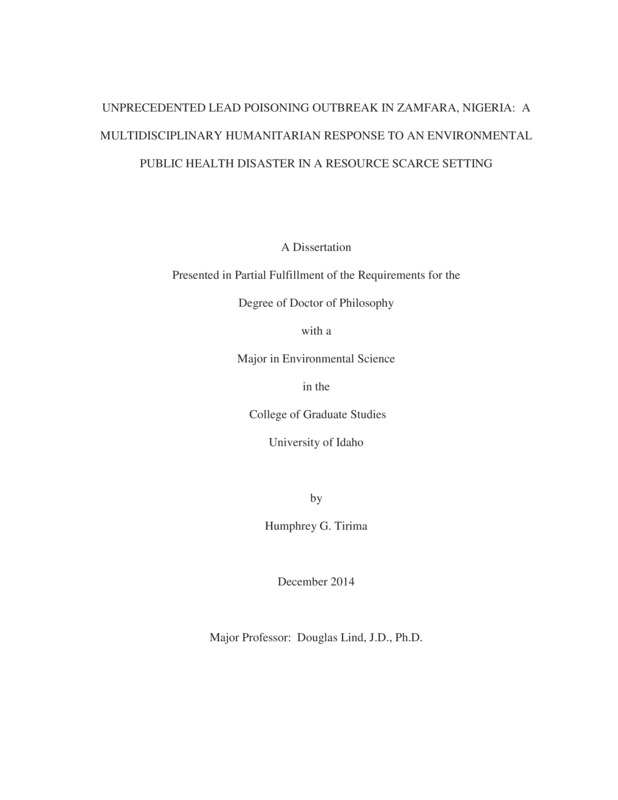UNPRECEDENTED LEAD POISONING OUTBREAK IN ZAMFARA, NIGERIA: A MULTIDISCIPLINARY HUMANITARIAN RESPONSE TO AN ENVIRONMENTAL PUBLIC HEALTH DISASTER IN A RESOURCE SCARCE SETTING
Tirima, Humphrey. (2014). UNPRECEDENTED LEAD POISONING OUTBREAK IN ZAMFARA, NIGERIA: A MULTIDISCIPLINARY HUMANITARIAN RESPONSE TO AN ENVIRONMENTAL PUBLIC HEALTH DISASTER IN A RESOURCE SCARCE SETTING. Theses and Dissertations Collection, University of Idaho Library Digital Collections. https://www.lib.uidaho.edu/digital/etd/items/tirima_idaho_0089e_10498.html
- Title:
- UNPRECEDENTED LEAD POISONING OUTBREAK IN ZAMFARA, NIGERIA: A MULTIDISCIPLINARY HUMANITARIAN RESPONSE TO AN ENVIRONMENTAL PUBLIC HEALTH DISASTER IN A RESOURCE SCARCE SETTING
- Author:
- Tirima, Humphrey
- Date:
- 2014
- Keywords:
- Blood lead levels Environmental Ethics Environmental Health Environmental Remediation Environmental Risk Humanitarianism
- Program:
- Environmental Science
- Subject Category:
- Environmental health; Environmental philosophy; Environmental engineering
- Abstract:
-
From 2010-2013, epidemic lead poisoning in Zamfara State, northern Nigeria was unprecedented in morbidity and mortality, as well as in the health and environmental response implemented to reduce blood lead levels and environmental exposures. More than 17,000 villagers were poisoned and 400-500 young children died from conducting artisanal gold mining. Socio-economic, logistic, and security challenges in these remote villages required a response undertaken within the context of local resources, labor practices, and cultural traditions.
This dissertation comprises three papers covering different aspects of the multidisciplinary response to the Zamfara lead poisoning outbreak. The first paper addresses remediation, which was implemented using U.S. hazardous waste removal protocols. Soil lead exposures were reduced by 97% and allowing 2,349 children to receive chelation treatment. Mean blood lead levels for children under five years of age declined from 173µg/dl to <20µg/dl over the four year remedial program.
The second paper is an investigation of dietary and para-occupational exposure pathways. Most of the dietary lead exposure was associated with contamination occurring during post-harvest processing and preparation of staple cereal grains and legumes. Average post-harvest and processed cereal grain lead levels were 0.41mg/kg and 0.85mg/kg dry weight, respectively. Contamination of cereal grains accounted for approximately 25% of total lead intake, contributing an estimated 14μg/dL to 23μg/dL increment in children's blood lead levels.
The final paper reflects on ethical dilemmas that emerged as the response unfolded. It proposes a provisional ethical framework of environmental humanitarianism which draws its features from several ethical traditions. It suggests certain characteristic that provide a basis for finding an imperative obligation to commit to a humanitarian environmental response. Such a response is called for when (1) overpowering sentiments of human sympathy or compassion suggest (2) that only humanitarian action can accord to persons suffering from an environmental disaster the respect they are due as beings with inherent worth and dignity, (3) that the action contemplated will serve overall human well-being (4) in a manner consistent with the Dunantist principles, and (5) that the action can be performed free of paternalist interference with any cultural aspects causally disconnected from the environmental disaster.
- Description:
- doctoral, Ph.D., Environmental Science -- University of Idaho - College of Graduate Studies, 2014
- Major Professor:
- Lind, Douglas
- Committee:
- von Braun, Margrit; von Lindern, Ian; Boll, Jan
- Defense Date:
- 2014
- Identifier:
- Tirima_idaho_0089E_10498
- Type:
- Text
- Format Original:
- Format:
- application/pdf
- Rights:
- In Copyright - Educational Use Permitted. For more information, please contact University of Idaho Library Special Collections and Archives Department at libspec@uidaho.edu.
- Standardized Rights:
- http://rightsstatements.org/vocab/InC-EDU/1.0/

